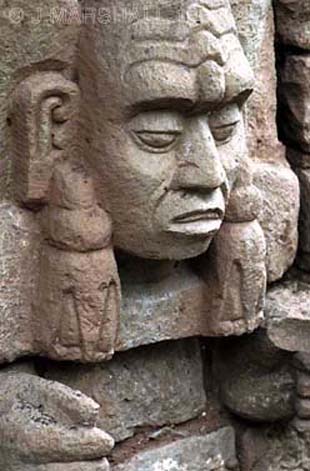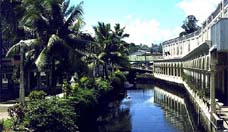2005.08.25: August 25, 2005: Headlines: COS - Honduras: Blogs - Honduras: Personal Web Site: Peace Corps Volunteer Karen writes: The day finally came—the day I boarded my last bus out of Colomoncagua
Peace Corps Online:
Directory:
Honduras:
Peace Corps Honduras:
The Peace Corps in Honduras:
2005.08.25: August 25, 2005: Headlines: COS - Honduras: Blogs - Honduras: Personal Web Site: Peace Corps Volunteer Karen writes: The day finally came—the day I boarded my last bus out of Colomoncagua
Peace Corps Volunteer Karen writes: The day finally came—the day I boarded my last bus out of Colomoncagua

Now that I am looking back on the entire experience, I realize that more than anything I have done or contributed, the Peace Corps for me has been a journey into understanding myself and where I came from. It sounds strange to say that because my ancestors are not Latino. But at times, living here has felt like a journey back in history to the lifestyle my grandmother must have experienced in her village of Münnerstadt, Germany during the 1920s, 30s and 40s. It too was a rural, agrarian village ravaged by economic depression and limited educational opportunities. Like in Colo, she lived in a place where gender roles were strictly defined. She served my grandfather every single day of their life together just as so many women here serve their families and that defines who they are. Like many of the young women from villages in Honduras, my grandmother completed her formal education in the seventh grade and began working as a house servant at age 14.
Peace Corps Volunteer Karen writes: The day finally came—the day I boarded my last bus out of Colomoncagua
Thursday, August 25, 2005
From karenscheuerer@hotmail.com
Dear family and friends,
The day finally came—the day I boarded my last bus out of Colo. On that 5am busito, before dawn had poked her head, I shed tears for the community that had opened itself up to me over the past two years. I didn’t cry because I wanted to stay longer or because Colo necessarily needed me. No, I wept for each of the Colomoncagüenses (inhabitants of Colomoncagua) who had shared with me their struggles, their trials and tribulations, their dreams, their humility and common humanity.
When they sent me off with heartfelt goodbyes, kind words and generous gifts, it occurred to me that the magic of Colomoncagua is, of course, the people, but in particular, the fact that they are stripped of many of the material comforts and adornments that we so take for granted in the U.S. In this way, they seem rawer----more real. Even though my American upbringing and acculturation has taught me different values and priorities than theirs, our common humanity binds us. Their spirits will forever reside with me.
Now that I am looking back on the entire experience, I realize that more than anything I have done or contributed, the Peace Corps for me has been a journey into understanding myself and where I came from. It sounds strange to say that because my ancestors are not Latino. But at times, living here has felt like a journey back in history to the lifestyle my grandmother must have experienced in her village of Münnerstadt, Germany during the 1920s, 30s and 40s. It too was a rural, agrarian village ravaged by economic depression and limited educational opportunities. Like in Colo, she lived in a place where gender roles were strictly defined. She served my grandfather every single day of their life together just as so many women here serve their families and that defines who they are. Like many of the young women from villages in Honduras, my grandmother completed her formal education in the seventh grade and began working as a house servant at age 14.
In addition to gaining a window into the world of my family’s past, I now have a broader understanding of the immigration picture. Just as my grandparents and father fled 1950s Germany in search of improved economic opportunities, Hondurans and Salvadorans are leaving here in pursuit of dreams of material wealth and greater opportunities for their families. Having witnessed first hand the sacrifices these families have made to emigrate affords me a keener understanding of what it must have been like for my own family. Yet, my father and grandparents had the advantage of legal immigration to the United States. Most Central Americans spend their time in the States running scared of the INS, which prevents them from truly integrating into our society.
But perhaps in my case, joining the Peace Corps was a foregone conclusion. My parents were Peace Corps volunteers in Brazil in the 1960s. As a kid, I grew up hearing Peace Corps stories that inspired me to seek my own adventures in life. That yearning to travel and desire to challenge myself ultimately would lead me here. Through this experience, like my fellow 2nd generation PC volunteers, we have gained insight into what our parents must have seen when they were younger, idealistic vagabonds. In many ways, my own experience resembles much of my parents experience in Brazil forty years ago. It seems sad to say, doesn’t it? It forces us to ask ourselves what difference our work really makes.
I would argue that the difference lies in each of us who have opted to do this thing and who have put ourselves in a completely different reality than that to which we are accustomed. We all seem to agree that we will forever be marked by the experience. Our world view has changed. We will now view things through a different set of lenses than we did when we arrived here.
And so it is that I leave Honduras. Tomorrow, I will board another one of those ridiculously early chicken buses to make my way South to Nicaragua, Costa Rica and Panama. The wanderlust hasn’t yet left me, so I have to take advantage of the fact that I am already in Central America and discover those places that to me are little more than fuzzy outlines on a map.
After my travels, I will return to the US—Brooklyn to be exact. I don’t know what it is I will be doing there yet. So I am giving myself time to figure it out. Because if I have learned anything from the Peace Corps, it’s that “hay más tiempo que vida”---“there’s more time than life”.
Thank you all for being such devoted supporters and interested listeners over the past two years. Your emails and notes of encouragement have touched me deeply. I hope to see you all soon.
Love,
karen
Links to Related Topics (Tags):
Headlines: August, 2005; Peace Corps Honduras; Directory of Honduras RPCVs; Messages and Announcements for Honduras RPCVs; Blogs - Honduras
When this story was posted in December 2006, this was on the front page of PCOL:





Peace Corps Online The Independent News Forum serving Returned Peace Corps Volunteers
 | All Volunteers Safe in Fiji
All Volunteers in Fiji are safe and accounted for. The Peace Corps is monitoring the situation very closely. Volunteers are on standfast but there are no plans for evacuation at this time. Peace Corps is working closely with the US embassy and with host country partners to monitor the situation. Peace Corps is confident that volunteers are not in harm's way. The military seized control of Fiji on December 5 after weeks of threats. Subscribe to our news feed to read the latest breaking news. |
 | Ron Tschetter in Morocco and Jordan
On his first official trip since being confirmed as Peace Corps Director, Ron Tschetter (shown at left with PCV Tia Tucker) is on a ten day trip to Morocco and Jordan. Traveling with his wife (Both are RPCVs.), Tschetter met with volunteers in Morocco working in environment, youth development, health, and small business development. He began his trip to Jordan by meeting with His Majesty King Abdullah II and Her Majesty Queen Rania Al Abdullah and discussed expanding the program there in the near future. |
 | Chris Dodd's Vision for the Peace Corps
Senator Chris Dodd (RPCV Dominican Republic) spoke at the ceremony for this year's Shriver Award and elaborated on issues he raised at Ron Tschetter's hearings. Dodd plans to introduce legislation that may include: setting aside a portion of Peace Corps' budget as seed money for demonstration projects and third goal activities (after adjusting the annual budget upward to accommodate the added expense), more volunteer input into Peace Corps operations, removing medical, healthcare and tax impediments that discourage older volunteers, providing more transparency in the medical screening and appeals process, a more comprehensive health safety net for recently-returned volunteers, and authorizing volunteers to accept, under certain circumstances, private donations to support their development projects. He plans to circulate draft legislation for review to members of the Peace Corps community and welcomes RPCV comments. |
 | He served with honor
One year ago, Staff Sgt. Robert J. Paul (RPCV Kenya) carried on an ongoing dialog on this website on the military and the peace corps and his role as a member of a Civil Affairs Team in Iraq and Afghanistan. We have just received a report that Sargeant Paul has been killed by a car bomb in Kabul. Words cannot express our feeling of loss for this tremendous injury to the entire RPCV community. Most of us didn't know him personally but we knew him from his words. Our thoughts go out to his family and friends. He was one of ours and he served with honor. |
 | Peace Corps' Screening and Medical Clearance
The purpose of Peace Corps' screening and medical clearance process is to ensure safe accommodation for applicants and minimize undue risk exposure for volunteers to allow PCVS to complete their service without compromising their entry health status. To further these goals, PCOL has obtained a copy of the Peace Corps Screening Guidelines Manual through the Freedom of Information Act (FOIA) and has posted it in the "Peace Corps Library." Applicants and Medical Professionals (especially those who have already served as volunteers) are urged to review the guidelines and leave their comments and suggestions. Then read the story of one RPCV's journey through medical screening and his suggestions for changes to the process. |
 | The Peace Corps is "fashionable" again
The LA Times says that "the Peace Corps is booming again and "It's hard to know exactly what's behind the resurgence." PCOL Comment: Since the founding of the Peace Corps 45 years ago, Americans have answered Kennedy's call: "Ask not what your country can do for you--ask what you can do for your country. My fellow citizens of the world: ask not what America will do for you, but what together we can do for the freedom of man." Over 182,000 have served. Another 200,000 have applied and been unable to serve because of lack of Congressional funding. The Peace Corps has never gone out of fashion. It's Congress that hasn't been keeping pace. |
 | PCOL readership increases 100%
Monthly readership on "Peace Corps Online" has increased in the past twelve months to 350,000 visitors - over eleven thousand every day - a 100% increase since this time last year. Thanks again, RPCVs and Friends of the Peace Corps, for making PCOL your source of information for the Peace Corps community. And thanks for supporting the Peace Corps Library and History of the Peace Corps. Stay tuned, the best is yet to come. |
 | History of the Peace Corps
PCOL is proud to announce that Phase One of the "History of the Peace Corps" is now available online. This installment includes over 5,000 pages of primary source documents from the archives of the Peace Corps including every issue of "Peace Corps News," "Peace Corps Times," "Peace Corps Volunteer," "Action Update," and every annual report of the Peace Corps to Congress since 1961. "Ask Not" is an ongoing project. Read how you can help. |
Read the stories and leave your comments.

Some postings on Peace Corps Online are provided to the individual members of this group without permission of the copyright owner for the non-profit purposes of criticism, comment, education, scholarship, and research under the "Fair Use" provisions of U.S. Government copyright laws and they may not be distributed further without permission of the copyright owner. Peace Corps Online does not vouch for the accuracy of the content of the postings, which is the sole responsibility of the copyright holder.
Story Source: Personal Web Site
This story has been posted in the following forums: : Headlines; COS - Honduras; Blogs - Honduras
PCOL35426
51



















